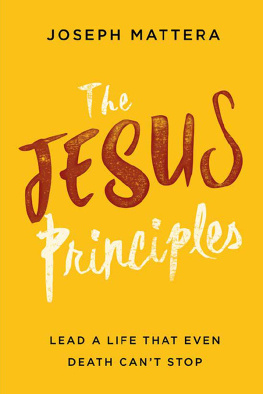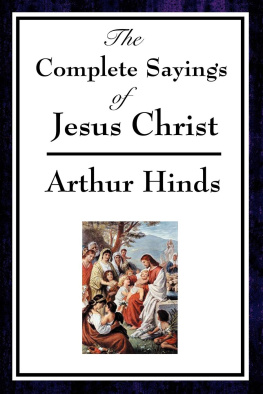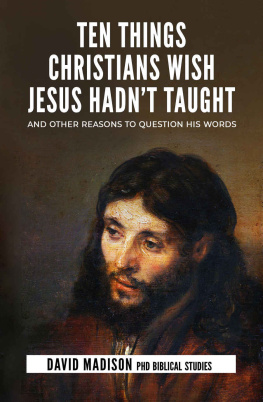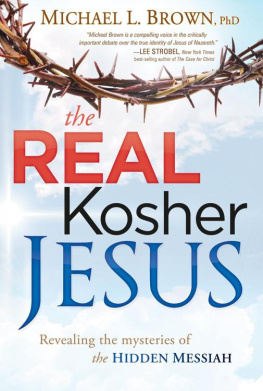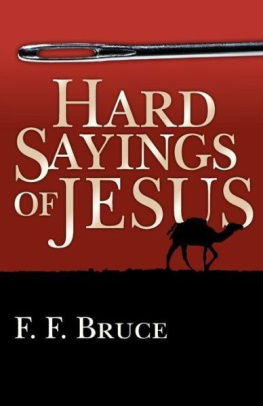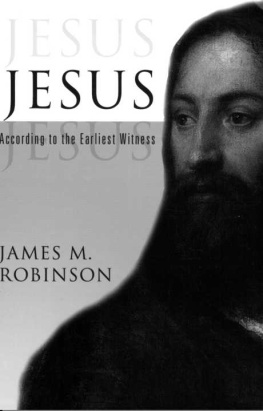Table of Contents
Guide


THE SAYINGS OF JESUS
Translation and editorial material copyright 1996 by Guy Davenport and Benjamin Urrutia
All rights reserved under International and Pan-American Copyright Conventions. No part of this book may be used or reproduced in any manner whatsoever without written permission from the publisher, except in the case of brief quotations embodied in critical articles and reviews.
Library of Congress Cataloging-in-Publication Data
Names: Davenport, Guy, translator. | Urrutia, Benjamin, translator.
Title: The sayings of Jesus : the logia of Yeshua / translated by Guy Davenport and Benjamin Urrutia.
Other titles: Logia of Yeshua
Description: First Counterpoints series edition. | Berkeley : Counterpoint Press, 2019. | Series: Counterpoints | Originally published under title: The logia of Yeshua : the sayings of Jesus. Washington, D.C. : Counterpoint, c1996. | Includes bibliographical references.
Identifiers: LCCN 2019017874 | ISBN 9781640093454
Subjects: LCSH: Jesus ChristWords.
Classification: LCC BT306 .L583 2019 | DDC 226/.05209dc23
LC record available at https://lccn.loc.gov/2019017874
Series design by Jenny Carrow
Cover design by Sarah Brody
Book design by Jordan Koluch
COUNTERPOINT
2560 Ninth Street, Suite 318
Berkeley, CA 94710
www.counterpointpress.com
Printed in the United States of America
Distributed by Publishers Group West
10987654321
Contents

In the beginning was the Logion.
L ogion (plural logia), originally the Greek for saying, is now a technical term for important sayings of famous men of antiquity, such as Heraclitus, Socrates, and Yeshua, whom we commonly call Jesus. Collections of Yeshuas logiaSayings Gospelspreceded the now familiar gospels, just as the Yeshua Movement preceded the Christian Church. Among these early collections was a Hebrew document, attributed to Matthew, which may or may not be the same as Q (the hypothetical source of logia for both the Gospels of Matthew and of Luke). Another was the Gospel of Thomas, which later was expanded, translated into Coptic, and then expanded some more. Of the multitude of gospels that, according to Luke, preceded his own, at least these two or three, or perhaps a considerable portion, were Sayings Gospels.
Why was there a whole genre of gospels that consisted entirely of logia, without accounts of the Nativity, the Crucifixion, the Resurrection? Let us remember that Mark and John show no interest either in the story of Yeshuas birth. And it is quite possible that to many early followers of Yeshua his death was just as irrelevant as his birth was to Marks and Johns readers. Only what Yeshua taught matterednot the story of his life. It is also possiblethough not too likelythat the first logia collections may have been written before the Crucifixion and Resurrection, so they could not be expected to mention them, except, perhaps, prophetically.
If the gospels of the logia were written soon after the Crucifixion, as they probably were, their authors and readers may have felt that they were in no danger of forgetting the tragic and earthshaking events, but the Sayings needed to be written down to be remembered accurately by the community.
For Docetics and Gnostics, who denied the reality of the Crucifixion, the Sayings Gospels proved to be a very congenial genre. Unfortunately, they could not resist adding their own bits of so-called Gnosis to them. Neither were the authors of the Orthodox mainstream gospels above glossing the logia (as well as, of course, combining them with accounts of the Crucifixion and Resurrectionand of the Nativity in a couple of cases).
The original logia were shocking and paradoxical, somewhat like Zen koans or Sufi anecdotes. The Orthodox evangelists softened the hard sayings and dulled their sharp edges by covering them up with facile explanations and simplistic morals at the conclusion of subversive parables. Worst of all, many logia were embedded in tendentious stories that served the purposes of the growing churches.
Sren Kierkegaard averred that the churches are the sepulchres of the prophets. Similarly, the gospels are the graves of the logia. Presenting the sayings of Yeshua without the ecclesiastical accretions is akin to what the Wahabbis of Saudi Arabia did when they smashed the tombs of the prophets and saints in their iconoclastic struggle against superstition and idolatry. Here are the logia themselves, freed from glosses and simplistic morals.
I began the compilation and editing in 1977. At a certain stage, I asked Professor Davenport for his opinion. His suggestions, both for the work as a whole and for specific changes, were so valuable that I invited him to collaborate. We made several drafts, each of us revising the others phrasing, until the text became a true and seamless fusion of our ideas about how the logia should sound in the modern English language.
We have kept commentary to a bare minimum. In the Sources and Notes at the end of this book we give our reasons for our most unorthodox inclusions and idiosyncratic translations. Otherwise, we let the sayings speak for themselves.
For any and all errors, we accept full responsibility, and ask to have them pointed out logically, rationally, and specifically. We also urge readers not to submit to the authority of churches or scholars, but to decide for themselves which of the logia are authentic.
This work is dedicated to Shannon Cole, who assisted the work with praise and encouragement; to Kent Jeppsen, who read parts of several drafts and made valuable suggestions for improvements; and to my friend Gracia Fay Ellwood and my teacher Dr. Hugh Nibley, who have helped me to understand better the life, teachings, and personality of Yeshua.
We are in debt to hundreds of scholars who have studied the life and logia of Yeshua and written and taught about them. The following, listed in alphabetical order, have made specific proposals that we have used:
Harvey Falk, author of Jesus the Pharisee: A New Look at the Jewishness of Jesus.
Robert Graves and Joshua Podro, authors of The Nazarene Gospel Restored.
The Scholars of the Jesus Seminar.
Stephen Mitchell, author of The Gospel According to Jesus.
Geza Vermes, author of Jesus the Jew: A Historians Reading of the Gospels.
BENJAMIN URRUTIA
T his little book of Jesus sayings began with a fortuitous encounter. Benjamin Urrutiateacher, soldier in the Israeli army, writer, linguist, scholar, and Basque Jewish Christian born in South Americaread a story of mine in A Table of Green Fields, in which he saw that I had used various papyri and Talmudic sources. The story is about the child Jesus (Yeshua, that is, Joshua, which gets spelled Iesous in Greek and Jesus in Latin) one-upping his teacher in school. Benjamin, probably alone among my readers, recognized little Yeshuas We havent yet finished with alef and here we are going on to beth as an anecdote from an ancient manuscript,
Next page


